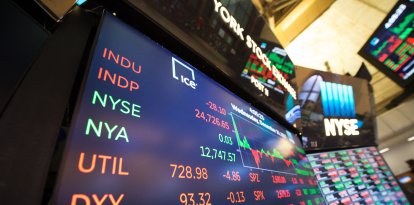U.S. stocks fall after Trump's tariff announcements
With the Republican administration's tariffs now in place, the market faces a period of complex adjustment.

Wall Street
U.S. stock markets suffered a major blow Monday after President Donald Trump confirmed that 25% tariffs on imports from Canada and Mexico would take effect at the close of trading. The decision, which also includes a tariff hike on China from 10% to 20% starting Tuesday, dashed Wall Street expectations for a less disruptive solution to global trade. The announcement compounded concerns about the U.S. economy.
A black Monday on Wall Street
The S&P 500 fell 2 percent in late trading, heading for its worst day since December. The index, which maintained some stability during the morning, began to slump in the afternoon and accelerated its losses following Trump's statements that there was "no room left" for negotiations to soften tariffs.
The Dow Jones Industrial Average lost 735 points, down 1.7%, just 45 minutes from the close, while the tech-laden Nasdaq Composite plunged 2.6%. The declines mark the end of a bullish streak that had pushed the S&P 500 to a record last month, buoyed by strong corporate earnings reports.
The recent market volatility reflects a change in mood: investors, who celebrated positive results in February, now face disappointing economic data and the potential impact of Trump's tariff policies.
Manufacturing in check and the economic impact.
Monday saw the release of a report from the Institute for Supply Management that revealed weaker-than-expected manufacturing activity. Although the sector continues to grow, the pace is slower than economists predicted. More worrisome, new orders are contracting, and prices are rising amid debates over who will absorb the cost of tariffs.
"Demand eased, production stabilized, and destaffing continued as panelists’ companies experience the first operational shock of the new administration’s tariff policy,” said Timothy Fiore, chair of the Institute for Supply Management’s manufacturing business survey committee.
Wall Street had harbored hopes that Trump would use tariffs as a negotiating tactic, ultimately opting for less drastic measures. However, his uncompromising stance has dispelled those illusions, leaving investors facing a landscape of economic and trade uncertainty.
Tech giants and cryptoassets in the storm.
The impact was not limited to broad indexes. Tech companies such as Nvidia, which had been a market driver, plunged 9.4%, while Tesla, led by Elon Musk, fell 4.3%. These losses reflect the sensitivity of tech firms to business disruptions and inflation expectations. Even the cryptocurrency sector, which had initially rallied following Trump's comments about a strategic stockpile of cryptoassets, ended up giving ground: MicroStrategy was down 3.1% and Coinbase was down 5%.
On the other hand, Kroger, a major supermarket chain, fell 2.9% following the resignation of its president and CEO, Rodney McMullen, after an internal investigation into his personal conduct, adding further pressure to an already nervous market.
Global reactions and emergency strategies.
While Wall Street was reeling, international markets showed mixed responses. In China, manufacturers reported a surge in orders in February as importers rushed ahead of higher U.S. tariffs. Chinese state media indicated that Beijing is evaluating retaliation. In Hong Kong, shares of Mixue Bingcheng, a bubble tea chain, soared 43% on debut, and the Hang Seng index rose 0.3%.
In Europe, markets rose following a report showing subdued inflation in February, fueling expectations of a rate cut by the European Central Bank. The German DAX advanced by 2.6% and the French CAC 40 by 1.1%, highlighting stronger performance outside the United States.
Bonds and economic outlook
In the bond market, the 10-year Treasury yield fell to 4.16% from 4.24%, reflecting growing concerns about a possible economic slowdown. While a drop in yields is usually a boost for stocks by making credit cheaper, this time the reason (lower growth expectations) offers no solace, according to strategists at Morgan Stanley led by Michael Wilson.
With the Republican administration's tariffs now in place, the market faces a period of complex adjustment. The combination of a slowing U.S. economy, rising inflation, and global trade tensions poses a significant challenge for investors and companies alike.

























